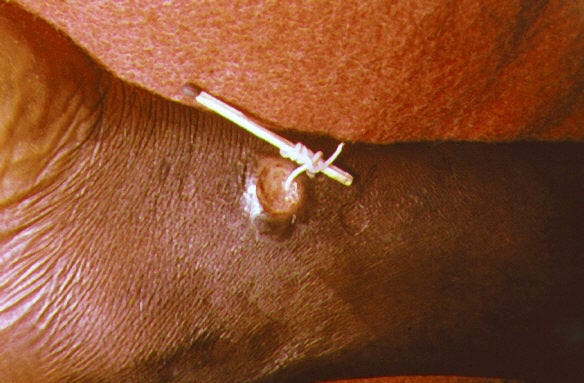The Carter Center reported that in 2023, 13 provisional human cases of Dracunculiasis, or Guinea worm disease were reported worldwide in 2023, matching the lowest annual total of human cases ever reported, following 13 cases in 2022.

Nine of the 13 provisional human cases reported in 2023 occurred in Chad, two in South Sudan and one each in Cameroon and Mali. Ethiopia reported zero human cases.
In 1986, when the Carter Center assumed leadership of the global Guinea Worm Eradication Program, an estimated 3.5 million human cases occurred annually in 21 countries in Africa and Asia.
Reported infections in animals rose modestly, from 685 in 2022 to 713 in 2023.
“Eradicating Guinea worm disease and the suffering it causes has long been a dream of my grandparents, and they have worked incredibly hard to make it a reality,” said Jason Carter, Carter Center board chair and eldest grandson of former U.S. President Jimmy Carter and the late First Lady Rosalynn Carter.
Considered a neglected tropical disease, Guinea worm disease (dracunculiasis) is contracted when people consume water contaminated with tiny crustaceans that carry Guinea worm larvae. The larvae mature and mate inside the patient’s body. The male worm dies. After about a year, a meter-long female worm emerges slowly through a painful blister in the skin. Contact with water stimulates the emerging worm to release its larvae into the water and start the process all over again. Guinea worm disease incapacitates people for weeks or months, reducing individuals’ ability to care for themselves, work, grow food for their families, or attend school.
Without a vaccine or medicine, the ancient parasitic disease is being wiped out mainly through community-based interventions to educate and change behavior, such as teaching people to filter all drinking water and preventing contamination by keeping patients from entering water sources.
In addition, tethering dogs to keep them out of water and not allowing them to eat potentially contaminated fish entrails are key factors in preventing Guinea worm infection in animals.
Eradication means a disease has been eliminated worldwide, with no natural possibility of return. The final cases are the most challenging, requiring persistence, ingenuity, and enormous amounts of resources to operate in difficult, remote, and often insecure areas. Only one human disease has ever been eradicated; that was smallpox, in 1980. For a disease to be declared eradicated, every country in the world must be certified free of human and animal infection, even countries where transmission is never known to have taken place. To date, the WHO has certified 200 countries free of Guinea worm; only six have not been certified: Angola, Chad, Ethiopia, Mali, South Sudan, and Sudan.




